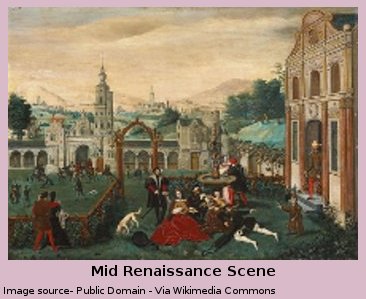Human Intelligence Is Emerging As
An Integral Force of Human Affairs
Part 8 - Part 7
The Importance Of Spectacles
Human intelligence is well on the way to establishing itself as an integral component of Human affairs. We are entering the 14th century AD, the beginning of The Renaissance, an age that will last for the next three hundred years.

It was around this time spectacles became more widespread and more common.
Sharing the circumstances relating to many early innovations, the origin of spectacles is shrouded in a haze of uncertainty.
Nevertheless, a mysterious genesis has not detracted from the huge effect spectacles have had on the advancement of Humanity.
In particular, that influence spectacles held, and still holds, in the
field of Economics. An ability to see distinctly would have retained
numerous people in productive employment.
The invention of
spectacles resolved what must have been a serious economic restraint.
Not to mention relieving the encumbrance of poor eyesight on personal
welfare.
Folk who were either born with defective vision, or developed it as they aged were liberated from a major lifestyle impediment. In Particular, age related Presbyopia, the inability to see clearly at close range. An encumbrance that eventually affects every individual.
Before spectacles became freely available, jobs were
jeopardized and skills that were built up over a lifetime were lost to
the economy, and Humanity in general. Of specific loss would be the
contributions of those Humans with an inventive nature.
In an
ironic twist, it is worth noting that it took several hundred years for
arms to appear on specs. A good example of Human's general unawareness
of the intelligence at their disposal.
Spectacles have been, and still are, an indispensable aid in executing our Human intelligence.
About Time
Another indispensable aid to the implementation of intelligent progress of this period, the newly invented mechanical clock, would gradually supersede the water clock created in antiquity.
Mathematics Picks Up Speed
Mathematics gathers momentum. Madhava, (1350-1425) An Indian born Mathematical Pioneering Genius, helps to lay the foundations for Calculus.

Madhava also contributed generously, intellectually speaking, to the development of other branches of mathematics, including Trigonometry, Geometry, and Algebra.
Prescient Mind
At the leading edge of progress,
courtesy of the Gutenberg Printing Press, German mathematician, Adam
Ries, (1492-1559) published short arithmetic textbooks intended for
anyone who was willing to learn.
Amongst other Great Minds, these two Good Humans
contributed to the core development of two highly prized assets
available to all people. Highly desirable assets of enhanced Human
Intelligence, and Self Reliance.
Adam Ries textbooks contained
all the branches of arithmetic taught in primary school today. Including
division, which during Ries time was an uncommon skill.
Another Dark Mind
Scottish born Protestant, Theologian, land owner, and part time Mathematician, John Napier, (1550-1617) invents, amongst other contributions to mathematics, Logarithms.
John Napier, a keen horticulturist, was perhaps the first person to experiment with chemical fertilizer.
In
just another example of Human intelligence being unrelated to Moral
Thinking, this man's fertile mind had a disturbing dark side, imagining
en masse destruction of 'enemy' forces by various means.
Conspicuous Human Intelligence
All round Italian Genius, Leonardo da Vinci, (1452-1519) appears on life's stage and does his darnedest to bring the future forward.

Apart from his consummate ability as an artist, Leonardo's inventive nature led him to research and dabble in diverse fields of science. Subsequently leaving Works Of Art, and Influential Observations, in his wake for perpetuity.
Super Cool Dude
This super cool dude encompassed such a wide spectrum of Human intelligence that it leaves one in utter awe of his Mind.
A number of years ago, this author attended an exhibition that replicated Leonardo da Vinci's lifework. A mesmerizing experience of an intuitive mind that remains with him as though it were yesterday.
This Great Mind's thinking was impeccable, except for one serious consideration . . .
He, like John Napier
et al, had a dark side, which was evident in his designs of horrific
killing machines. These may have been inspired by the times. If so, in
this respect his thinking was flawed.
This author, for one, would be admirably impressed had Leonardo da Vinci, and John Napier, et al, used their Human Intelligence to find and implement solutions for a Peaceful World instead.
Personal Development Rocks!
Part 8 - Part 7
Next - Finding Truth





